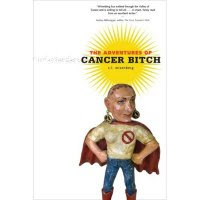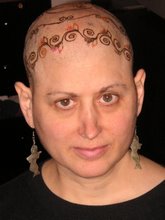
Alert readers will recall that Cancer Bitch has a rare blood disease that borders on cancer. It becomes cancer when plaintiffs' lawyers go after the people who allegedly caused it in their clients. Otherwise it's pre-cancerous. It appears mostly in men over 60, so she doesn't know what she did to get it, besides having a certain JAK2 gene mutation. The condition is called polycythemia vera and those that have it have too many platelets and red blood cells. One of the symptoms of the disease is itchy skin, especially after a hot shower.
Cancer Bitch has not taken a hot shower in years because of this. She has taken very quick warm showers and jump-in-jump-out baths because she wants to avoid hot water. In the past few weeks, she's been itchy all the time, and it ranges from regular old dry itchy skin to just-like-the-time-she-kneeled-on-the-ant-hill: itchy and painful pins and needles. It seemed for a while that benedryl could tackle the itch, but then it seemed it could not. Friday she itched and scratched during dinner. Saturday she was itchy and uncomfortable and on the way home from grading papers, she whimpered and cried in the privacy of her car. She couldn't tell if she was weeping because her skin hurt so much and she felt feverish, or because she felt, It will always be thus, why do I deserve this? She never asked, Y Me? about the cancer, but she was asking it about PV. She could understand how Spalding Gray killed himself because he couldn't relieve physical pain. She didn't know, either if she was scared and panicky because she'd run out of Effexor for a day and half, and didn't know what is fear caused by pain and what is fear caused by fear of pain.
She stopped at the drug store to pick up the Effexor and she asked the pharmacist if there was anything stronger than OTC cortisone cream. The pharmacist said her doctor could prescribe cortisone. And Cancer Bitch thought how terrible and impossible it would be to take cortisone for the rest of her life; it would dissolve her bones and maybe make her crazy, out of one's tree, as Stanley Elkin once put it.
She became Scarlett O'Hara asking, What is to become of us?, us being herself and her rare blood condition.
It was early evening and she was still weepy when she arrived home and her husband L said Why not call your hematologist? She was too choked up to do it so he called and left a message with a real live person to leave a message with the hematologist on call. Soon a hematology Fellow called the Cancer Bitch residence and said, Your itchiness may be due to a higher platelet count, so before I prescribe something you should go to the ER and get your blood count. So that is why Cancer Bitch and consort spent four-and-a-half hours in the Fancy ER. During which time a student nurse chased after a vein in the crook in Cancer Bitch's elbow, digging into it, really, and that is why Cancer Bitch yelled out, Shit, shit! when she has never before cursed or yelled out anything during any procedure ever before involving a needle in pursuit of a vein. L said that she would have a bruise the next day, and it was so: it's fuchsia and about three inches across and one inch high.
The blood was drawn and then it was examined and then it was told to Cancer Bitch that her platelet count was high, and then the ER doctor prescribed a lovely drug called Atarax, which STOPS THE ITCHING.
The question is, Why didn't Cancer Bitch's hematologist recommend this before? She will find out Wednesday, at her next appointment.
Meanwhile, Tuesday she is getting her womb opened up slightly so the gyne can examine her cervical cells to see if the abnormal cells she gathered for a biopsy are widespread and to see if there's a polyp still hiding in there. When the doctor described the procedure to her Monday, Cancer Bitch said, Is it a D & C? and the doctor said Yes, it's a D & C. D & C always sounded so mysterious, as if it were a cover-up for an abortion. It does take place sometimes after an abortion. But not in this case. In this case the doctor is probing for secrets of the womb, wanting to know if any cells have started down the road to becoming cancerous. Cervical cancer, we read, is slow-growing and it's one of the easiest cancers to treat. Taking tamoxifen can lead to cervical cancer, which is why the Cancer Bitch and her doctor are so wary.
Then Wednesday is the appointment with the hematologist who wants to put her on a pill that could eventually lead to leukemia, just like the condition itself, polycythemia vera, might.
Might might might. May. Quien sabe?



























